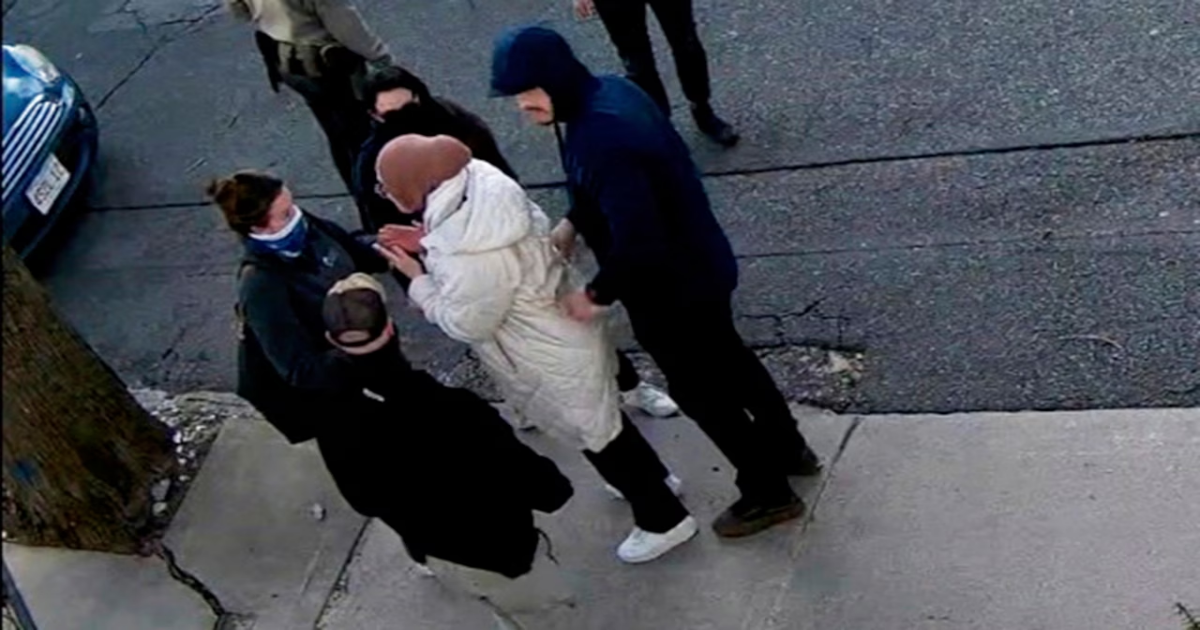A man in a blue sweatshirt walked up to Tufts University PhD student Rumeysa Ozturk on Tuesday evening and held up his hand to get her attention.
“Hey, ma’am, can I talk to you for a second?” he asked while the two were on Mason Street and Electric Avenue in Somerville.
Moments later, she was surrounded by six federal immigration agents who were in plainclothes and wearing masks. They placed a startled Ozturk into handcuffs in an incident captured on video.
Ozturk, a 30-year-old Turkish national, was headed to meet with friends to break her Ramadan fast on Tuesday, according to her lawyer, Mahsa Khanbabai. No charges have been filed against her, Khanbabai said.
“We are unaware of her whereabouts and have not been able to contact her,” Khanbabai said. “We hope Rumeysa will be released immediately.”
The video appears to show six people, their faces covered, taking away Ozturk’s phone as she yelled and was handcuffed.
“We’re the police,” members of the group are heard saying in the video.
A man is heard on camera saying, “Why are you hiding your faces?”
Khanbabai filed a petition in federal court challenging Ozturk’s detention and asking that she not be moved out of Massachusetts. U.S. District Judge Indira Talwani ordered Khanbabai to remain in the state, or that the government give 48 hours’ notice before moving her.
A copy of the petition was not publicly available because it concerns immigration. It is not clear what prompted the detainment of Ozturk.
Neighbors said they were left rattled by the arrest, which played out at 5:30 p.m. on a residential block.
“It looked like a kidnapping,” said Michael Mathis, a 32-year-old software engineer whose surveillance camera picked up the footage of the arrest. “They approach her and start grabbing her with their faces covered. They’re covering their faces. They’re in unmarked vehicles.”
Oztruk is studying child study and human development at Tufts and is set to complete her program this year, according to an op-ed she co-authored in the university’s student newspaper.
The op-ed calls for the university to accept a series of resolutions passed by the Tufts student senate, among which was a call to “acknowledge the Palestinian genocide.”
In a statement, Tufts said it was working to verify information it received about her visa having been terminated. Khanbabai said she was maintaining valid F-1 visa status as a student at Tufts.
Tufts had no knowledge of the incident before it happened and did not share any information with federal authorities, Kumar said in an email Tuesday night. The email does not identify Ozturk by name.
“We realize that tonight’s news will be distressing to some members of our community, particularly the members of our international community,” Kumar wrote. “We will continue to provide information, support, and resources in the days ahead as more details become available to us.”
Ozturk’s detainment comes just over a week after a Brown University professor was deported after U.S. Customs and Border Patrol terminated her visa. The federal government said the professor, Dr. Rasha Alawieh, had photos of leaders of Hezbollah and Iran on her phone.
It also comes after the arrest of three students at Columbia University involved in pro-Palestinian protests there.
Before attending Tufts, Ozturk graduated with a master’s degree from the Developmental Psychology program at Teachers College at Columbia University in New York, according to an alumni spotlight article in 2021. Her focus was on children’s media. She was also a 2018 Fulbright scholar at Columbia.
Reyyan Bilge, a psychology professor at Northeastern University and friend of Ozturk, described her as a “soft spoken, kind and gentle soul” who is deeply focused on her research and not closely involved in the campus protests.
“She’s really interested in developmental aspects of cognition and its overlap with children’s media,” Bilge said. “She’s not an activist person.”
The pair first met at Istanbul Sehir University, where Bilge supervised her thesis, before working together on cognitive research and co-publishing papers. They remained close once Ozturk arrived in the United States to continue her studies on the Fulbright Scholarship.
“Over the 10 years I’ve known her, she’s never spoken badly to anyone else, let alone being antisemitic or racist,” Bilge said.



